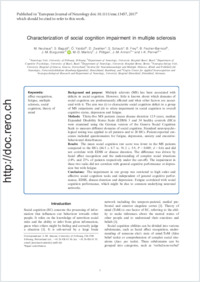Characterization of social cognition impairment in multiple sclerosis
- Neuhaus, Matthias Neurology Unit, University of Fribourg, Switzerland
- Bagutti, S. Neurology Unit, University of Fribourg, Switzerland
- Yaldizli, O. Department of Neurology, University Hospital Basel, Switzerland
- Zwahlen, D. Department of Cognitive Psychology, University of Basel, Switzerland
- Schaub, S. Department of Cognitive Psychology, University of Basel, Switzerland
- Frey, B. Department of Neurology, University Hospital Berne, Switzerland
- Fischer-Barnicol, B. Department of Neurology, University Hospital Basel, Switzerland
- Burgunder, Jean-Marc Department of Neurology, University Hospital Berne, Berne, Switzerland
- Martory, Marie-Dominique Neuropsychology Unit, University Hospital of Geneva, Geneva, Switzerland
- Pöttgen, J. Institut für Neuroimmunologie und Multiple Sklerose, Klinik und Poliklinik für Neurologie, Universitätsklinikum Hamburg-Eppendorf, Deutschland, Hamburg, Germany
- Annoni, Jean-Marie Neurology Unit, University of Fribourg, Switzerland
- Penner, I. K. Cogito Center for Applied Neurocognition and Neuropsychological Research and Department of Neurology, University Hospital Düsseldorf, Düsseldorf, Germany
-
24.10.2017
Published in:
- European Journal of Neurology. - 2018, vol. 25, no. 1, p. 90-96
English
Multiple sclerosis (MS) has been associated with deficits in social cognition. However, little is known about which domains of social cognition are predominantly affected and what other factors are associated with it. The aim was (i) to characterize social cognition deficit in a group of MS outpatients and (ii) to relate impairment in social cognition to overall cognitive status, depression and fatigue.Methods: Thirty-five MS patients (mean disease duration 12.9 years, median Expanded Disability Status Scale (EDSS) 3 and 34 healthy controls (HCs) were examined using the German version of the Geneva Social Cognition Scale to measure different domains of social cognition. Standard neuropsychological testing was applied to all patients and to 20 HCs. Patient-reported outcomes included questionnaires for fatigue, depression, anxiety and executive-behavioural disturbances.Results: The mean social cognition raw score was lower in the MS patients compared to the HCs (86.5 ± 8.7 vs. 91.2 ± 5.9, P = 0.005; d = 0.6) and did not correlate with EDSS or disease duration. The difference was driven by facial affect recognition and the understanding of complex social situations (14% and 23% of patients respectively under the cut-off). The impairment in these two tasks did not correlate with general cognitive performance or depression but with fatigue.Conclusions: The impairment in our group was restricted to high order and affective social cognition tasks and independent of general cognitive performance, EDSS, disease duration and depression. Fatigue correlated with social cognition performance, which might be due to common underlying neuronal networks.
- Faculty
- Faculté des sciences et de médecine
- Department
- Médecine 3ème année
- Language
-
- English
- Classification
- Social work
- License
-
License undefined
- Identifiers
-
- RERO DOC 306270
- DOI 10.1111/ene.13457
- Persistent URL
- https://folia.unifr.ch/unifr/documents/306205
Statistics
Document views: 139
File downloads:
- pdf: 444
